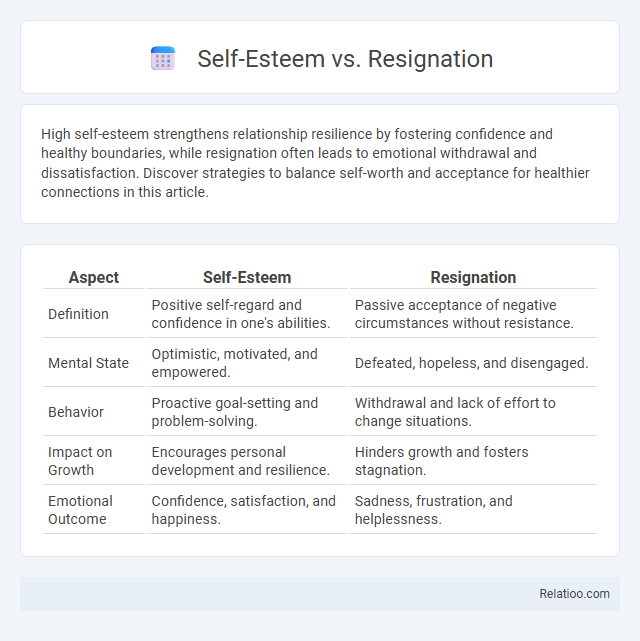High self-esteem strengthens relationship resilience by fostering confidence and healthy boundaries, while resignation often leads to emotional withdrawal and dissatisfaction. Discover strategies to balance self-worth and acceptance for healthier connections in this article.
Table of Comparison
| Aspect | Self-Esteem | Resignation |
|---|---|---|
| Definition | Positive self-regard and confidence in one's abilities. | Passive acceptance of negative circumstances without resistance. |
| Mental State | Optimistic, motivated, and empowered. | Defeated, hopeless, and disengaged. |
| Behavior | Proactive goal-setting and problem-solving. | Withdrawal and lack of effort to change situations. |
| Impact on Growth | Encourages personal development and resilience. | Hinders growth and fosters stagnation. |
| Emotional Outcome | Confidence, satisfaction, and happiness. | Sadness, frustration, and helplessness. |
Understanding Self-Esteem: Definition and Importance
Self-esteem represents an individual's overall subjective evaluation of their worth, influencing motivation, emotional well-being, and interpersonal relationships. High self-esteem fosters resilience and positive self-perception, while resignation often reflects a passive acceptance of adverse situations, potentially undermining personal growth. Understanding self-esteem's definition and importance is crucial for developing strategies that enhance mental health and combat feelings of helplessness associated with resignation.
What Is Resignation? Unpacking the Concept
Resignation refers to the acceptance of a situation or outcome, often accompanied by a sense of surrender or giving up. It differs from self-esteem, which reflects one's overall sense of self-worth and confidence. Understanding resignation involves recognizing it as a psychological response to perceived lack of control, where an individual ceases efforts to change circumstances and accepts the status quo.
Self-Esteem vs Resignation: Key Differences
Self-esteem reflects a positive self-evaluation and confidence in one's abilities, while resignation denotes acceptance of a difficult situation, often accompanied by a sense of defeat or hopelessness. High self-esteem fosters resilience and proactive problem-solving, whereas resignation may lead to passivity and decreased motivation. Understanding these key differences is essential for promoting mental health and encouraging adaptive coping strategies.
Causes of Healthy Self-Esteem Development
Healthy self-esteem develops through consistent experiences of acceptance, competence, and genuine social support during early childhood, which foster a positive self-concept and emotional resilience. Causes include secure attachment with caregivers, opportunities for mastery in challenging tasks, and constructive feedback that reinforces personal value without harsh criticism. In contrast, resignation often stems from repeated failures, neglect, or critical environments that diminish a sense of agency and worth, leading to passive acceptance of negative self-beliefs.
Factors Leading to Resignation in Life
Low self-esteem often contributes significantly to resignation, as doubts about personal worth and abilities diminish motivation to pursue goals. Factors leading to resignation in life include persistent failures, lack of support, and overwhelming stress, which collectively erode resilience and hope. Understanding these dynamics allows you to address underlying issues and develop strategies to rebuild confidence and persistence.
Psychological Impact: Confidence vs Defeat
Self-esteem fosters confidence by promoting a positive self-image and resilience in facing challenges, which enhances motivation and psychological well-being. In contrast, resignation often leads to feelings of defeat and helplessness, triggering negative emotions such as anxiety and depression that undermine mental health. Understanding these psychological impacts highlights the critical role self-esteem plays in maintaining mental resilience compared to the detrimental effects of resignation.
Overcoming Resignation: Strategies for Growth
Overcoming resignation involves cultivating self-esteem through positive self-affirmation and goal-setting techniques that reinforce personal value and capability. Strategies such as cognitive restructuring, mindfulness practices, and seeking social support empower individuals to challenge defeatist beliefs and embrace growth opportunities. Developing resilience by setting achievable milestones and celebrating progress helps transform resignation into motivation for continuous self-improvement.
Building Lasting Self-Esteem: Actionable Tips
Building lasting self-esteem requires consistent actions such as setting achievable goals, practicing self-compassion, and embracing failures as learning opportunities. Your mindset shifts positively when you replace resignation--a passive acceptance of defeat--with proactive habits that reinforce your value and capabilities. Prioritizing small daily victories and surrounding yourself with supportive influences strengthens your inner confidence and resilience over time.
The Role of Environment in Shaping Self-Perception
The environment significantly influences self-esteem by providing affirming or critical feedback that shapes self-perception and confidence levels. Negative surroundings foster resignation, where repeated exposure to discouragement leads to diminished motivation and acceptance of limitations. Positive environments promote resilience, encouraging individuals to overcome challenges and reinforce a healthy sense of self-worth.
Transforming Resignation into Empowerment
Transforming resignation into empowerment involves shifting the mindset from passive acceptance to proactive problem-solving, fostering self-esteem through achievable goals and positive self-reflection. Embracing resilience techniques and cognitive restructuring enhances emotional strength, reducing feelings of helplessness linked to resignation. Empowerment arises by cultivating self-efficacy and purpose, enabling individuals to reclaim control and create meaningful change despite challenges.

Infographic: Self-esteem vs Resignation
 relatioo.com
relatioo.com